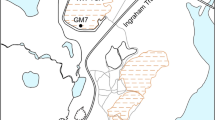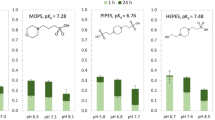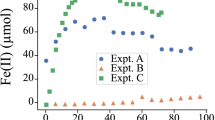Abstract
The biological availability and the toxicological effects of As depend on its chemical state1,2. It is therefore important to know the speciation and transformations of As in terrestrial and aquatic environments. Arsenite, As(III), is much more toxic than arsenate As(V) (ref. 2). The suspended and bottom sediments can potentially detoxify As(III) that enters aquatic systems by converting it to As(V) through abiotic oxidation3. We hypothesized that the oxides of Mn(IV) and Fe(III) may be the primary electron acceptors in the oxidation of As(III) because Mn and Fe readily participate in many oxidation–reduction reactions in natural environments; however, their role in the oxidation of As(III) to As(V) is yet to be established. We report here that Mn(IV) oxide is a very effective oxidant with respect to As(III); on the other hand, despite the thermodynamic favourability3, the evidence obtained from colorimetry and X-ray photoelectron spectroscopy shows that a redox reaction between Fe(III) oxide and As(III) does not occur within 72 h, indicating that the kinetics of the redox reaction between As(III) and Fe(III) is relatively slow.
This is a preview of subscription content, access via your institution
Access options
Subscribe to this journal
Receive 51 print issues and online access
$199.00 per year
only $3.90 per issue
Buy this article
- Purchase on Springer Link
- Instant access to full article PDF
Prices may be subject to local taxes which are calculated during checkout
Similar content being viewed by others
References
Webb, J. L. Enzyme and Metabolic Inhibitors Vol. 3, Ch. 6 (Academic, New York, 1966).
Ferguson, J. F. & Gavis, J. Wat. Res. 6, 1259–1274 (1972).
Oscarson, D. W., Huang, P. M. & Liaw, W. K. J. Envir. Qual. 9, 700–703 (1980).
McKenzie, R. M. Miner. Mag. 38, 493–502 (1971).
Stumm, W. & Morgan, J. J. Aquatic Chemistry, 547–553 (Wiley-Interscience, New York, 1970).
Hess, R. E. & Blanchar, R. W. J. Soil Sci. Soc. Am. 40, 847–852 (1976).
Healy, T. W., Herring, A. P. & Fuerstenau, D. W. J. Colloid Interface Sci. 21, 435–444 (1966).
Weast, R. C. (ed.) CRC Handbook of Chemistry and Physics 58th edn, D-151 (CRC, West Palm Beach, 1978).
Chao, T. T. Proc. Soil Sci. Soc. Am. 26, 764–768 (1972).
Oscarson, D. W., Rogers, J. S., Huang, P. M. & Liaw, W. K. Int. Rev. ges. Hydrobiol. 66, 95–107 (1981).
Oscarson, D. W., Huang, P. M. & Liaw, W. K. Clays Clay Miner., (in the press).
Jenne, E. A. Am. Chem. Soc., Adv. Chem. Ser. 73, 337–387 (1968).
Braman, R. S. in Arsenical Pesticides (ed. Woolson, E. A.) 108–123 (American Chemical Society, Washington DC, 1975).
Penrose, W. R. CRC Crit. Rev. Envir. Control. 4, 465–482 (1974).
Huang, P. M., Wang, T. S. C., Wang, M. K., Wu, M. H. & Hsu, N. W. Soil Sci. 123, 213–219 (1977).
Author information
Authors and Affiliations
Rights and permissions
About this article
Cite this article
Oscarson, D., Huang, P., Defosse, C. et al. Oxidative power of Mn(IV) and Fe(III) oxides with respect to As(III) in terrestrial and aquatic environments. Nature 291, 50–51 (1981). https://doi.org/10.1038/291050a0
Received:
Accepted:
Issue Date:
DOI: https://doi.org/10.1038/291050a0
This article is cited by
-
Influence of Surface Roughness of Stator on Dry Sliding Behavior against Rotor in Pneumatic Downhole Motor
Journal of Materials Engineering and Performance (2023)
-
Impact of δ-MnO2 on the chemical speciation and fractionation of Cr(III) in contaminated soils
Environmental Science and Pollution Research (2022)
-
Recent progress in instrumental techniques for architectural heritage materials
Heritage Science (2019)
-
Influence of epipsammic biofilm on the biogeochemistry of arsenic in freshwater environments
Biogeochemistry (2016)
-
Dissimilatory Arsenate Reduction and In Situ Microbial Activities and Diversity in Arsenic-rich Groundwater of Chianan Plain, Southwestern Taiwan
Microbial Ecology (2016)
Comments
By submitting a comment you agree to abide by our Terms and Community Guidelines. If you find something abusive or that does not comply with our terms or guidelines please flag it as inappropriate.



